In the ever-evolving world of cryptocurrency, securing digital assets has become paramount for both novice and experienced investors. As cyber threats continue to grow, the necessity of employing robust security measures has led to the adoption of various storage options for digital currencies. Among these, cold wallets stand out as a critical solution for those seeking the highest security for their cryptocurrency holdings. This comprehensive guide delves into the concept of a cold wallet, detailing its workings, types, and the essential precautions users must consider. Whether you are new to cryptocurrency or looking to enhance your security measures, understanding cold wallets is vital. Let’s explore how cold wallets function, the security they offer against potential cyber threats, and the key aspects users should be vigilant about when utilizing this method of crypto storage.
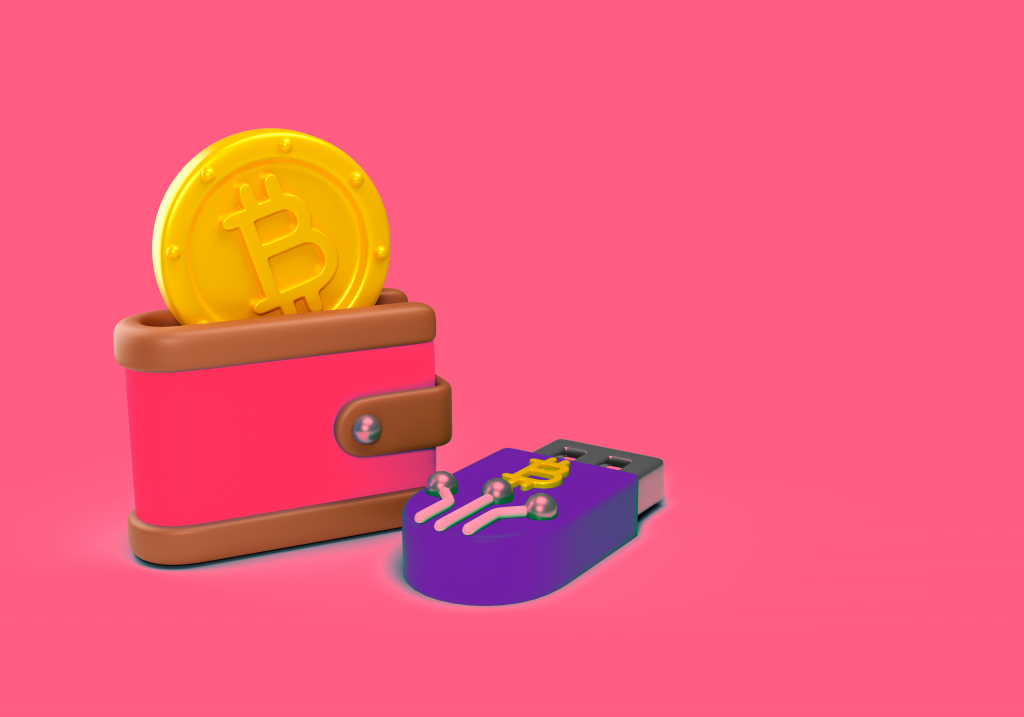
What is a Cold Wallet?
A cold wallet is simply a wallet that stores cryptocurrency and other digital assets without an internet connection. Crypto wallets or web3 wallets are designed to protect public and private keys, and cold wallets safeguard cryptocurrency keys offline using a hardware device. A cold wallet is also referred to as an offline wallet, hardware wallet, or cold storage wallet.
What are the Types of Cold Wallets?
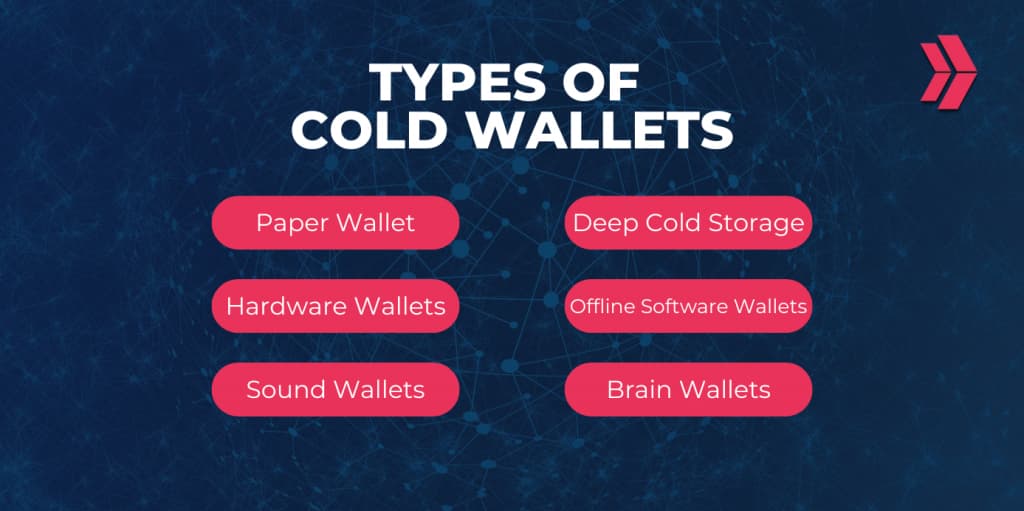
Cold wallet store cryptocurrency using hardware. Hardware refers to tangible items that can be seen and touched. The type of hardware used in storing cryptocurrency determines the type of cold wallets. They include the following:
Paper Wallet
Paper wallets are physically printed documents such as paper that have your public and private keys on them. Paper wallets have the keys printed in QR codes and can be accessed by scanning. A paper wallet is secure to use, provided the safety of the paper is not compromised because there is the risk of damage or theft. Paper wallets eliminate the possibility of hacking.
Hardware Wallets
Hardware wallets are physical devices that look like USB cables and are used to save private keys offline. Hardware wallets allow users to access their assets by connecting the device to computers using desktop apps. In addition, hardware wallets eliminate the risk of hacking as the private keys never leave the device. Good examples of hardware wallets are Ledger Nano S and Trezor.
Sound Wallets
Sound wallets are cold storage wallets where the seed phrase or private keys are stored as an encrypted audio file. The sound wallet is an encrypted cold wallet that can be likened to paper wallets but in an audio format. The wallet is decrypted using a stethoscope app, or the information will sound like white noise to listeners. A sound wallet is safe, but it is an expensive and obscure method of storing bitcoins or other cryptocurrencies.
Deep Cold Storage
Deep cold storage is a way of keeping your cold wallets from being accessed easily, even by the owner. Deep cold storage can include keeping your cold wallet in a vault or safe deposit box. However, despite the safety of using cold wallets, there is the risk of damaging the paper wallet or misplacing the hardware wallet.
Offline Software Wallets
Offline software wallet provides the function of both an offline and online wallet by storing the private keys offline and public keys online. Then, a new unsigned transaction is generated by the online wallet and sent to the offline wallet for signing. Finally, the signed transaction is broadcasted to the blockchain by the online wallet after it has been transferred from the offline wallet.
Using an offline software wallet will be difficult for less technical users, but it is safe to use. It eliminates the risk of hacking because the private key was never connected to the Internet. Users can remove the offline wallet after signing a transaction when using offline software wallets. Examples of offline software are Electrum and Armory.
Brain Wallets
Brain wallets are cold wallets that store private keys in the user’s memory rather than online. A brain wallet is a type of wallet where the user memorize the seed phrase after it has been generated. The drawback of a brain wallet is the possibility of forgetting the seed phrase. Mycelium is an open-source cold wallet that can generate seeds for a brain wallet.
Why Do You Need a Cold Wallet?
One of the drawbacks associated with crypto wallets is the risk of hacking. There have been so many cases of users losing their assets in hot wallets because of hacks. These hacks happen online, either by downloading malware, visiting phishing links, or even click-baiting.
A cold wallet is essential if you have cryptocurrency you cannot afford to lose. Cold wallets were created to eliminate hacks by storing private keys offline, making it impossible for hackers to access them via the internet. Another good reason why you need a cold crypto wallet is that it gives total control over private keys and funds.
How Does Cold Storage Work?
Web3 wallet simply stores private keys and public keys of crypto assets. Private keys are alphanumeric codes used in cryptography to access funds and prove cryptocurrency ownership. Public keys are code that can also be alphanumeric and allows users to receive assets. This dual-key system is fundamental to enhancing security and managing transactions within a web3 wallet.
Cold storage works by ensuring the safety of private keys and creating an offline environment for it to sign transactions. The private keys are temporarily connected to the internet to sign transactions and then disconnected to prevent hackers from accessing the private keys. Therefore, cold storage ensures the private keys are not connected to any server online, which can compromise its security.
What Happens When You Put Cryptocurrency in Cold Storage?
Cryptocurrency in cold storage means you are saving your wallet keys offline. Cryptocurrency ownership is stored on the blockchain, so you can always see your assets in your wallet but only access them with the private keys using a mobile cold wallet.
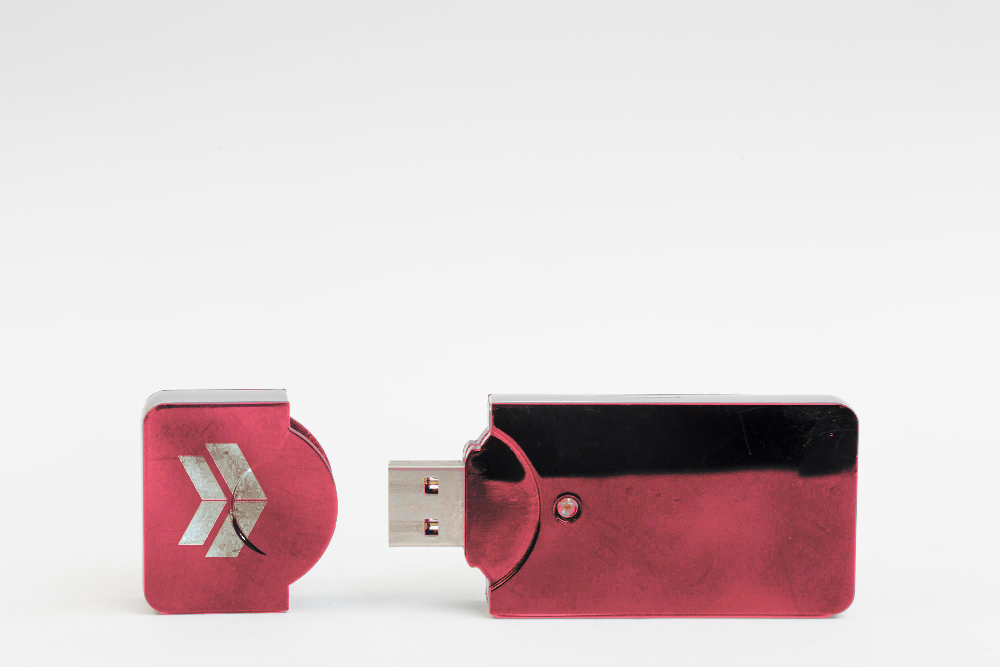
How to Use a Cold Wallet?
A cold wallet will help secure your bitcoin or altcoins by storing the seed phrase offline. Here is a step-by-step guide on how to use a cold wallet or transfer your assets to a cold wallet.
Step 1: Buy a Hardware Wallet
The first step is to buy a hardware wallet from any manufacturer of your choice online with your credit card or from stores near you. Ledger and Trezor are popular hardware wallet manufacturers.
Step 2: Set up The Hardware Wallet
After buying a hardware wallet, the next step is to set up the hardware cold wallet by following the instructions in the manual. You will need to set up a Pin for the wallet. During set up, write down the 24-word seed phrase given to you and keep it safe.
Step 3: Transfer Cryptocurrency
To transfer cryptocurrency into your cold wallet, you have to generate a public key that will be used to receive the crypto. Your public key will receive your preferred cryptocurrency in your cold wallet. You can also buy cryptocurrency using your credit card from different platforms and transfer it into your cold wallet.
Step 4: Store Safely
Disconnect your USB cold wallet from your computer and keep it safe when not in use.
What is The Difference Between a Cold and Hot Wallet?
The difference between a cold and hot wallet lies majorly in how their keys have been stored. A hot wallet has its private keys stored online, while a cold wallet has its private keys stored offline. The hot wallet vs. cold wallet debate is popular in cryptocurrency as many crypto enthusiasts prefer one over the other for different reasons. Here are the differences between a cold and hot wallet;
- Security
- User Experience
- Cost
- Capacity
- Suitable Users
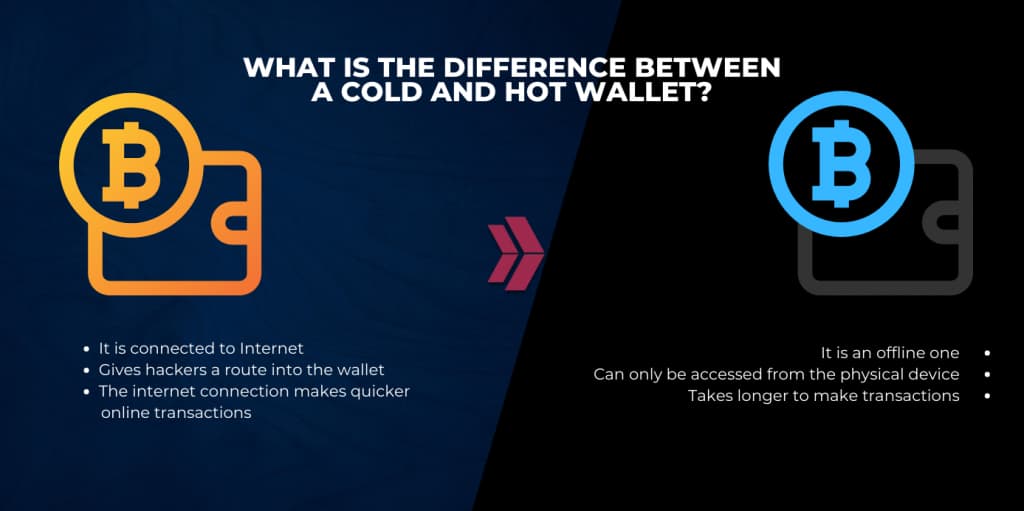
Security
Cryptocurrency is decentralized, and there is no insurance whenever assets are lost, meaning users should be responsible for securing their assets. In terms of security, cold wallets are considered more secure than hot wallets because they are not prone to online attacks like hacking.
Cold wallet crypto is secure because the private key is not connected to any server online, making it free from hacking. In contrast, the private key of a hot wallet is stored online, making it prone to attacks. In addition, some hot wallets are usually custodial wallets and password protected, giving a user little authority over their assets.
User Experience
It is easier to use a hot wallet than a cold wallet. Cold wallets require an extra step of connecting the hardware to the internet before transactions occur. Hot wallets do not require extra measures, making it easy for users to transact easily. In addition, setting up a cold wallet can be difficult for users that are less technical.
Cost
A crypto cold wallet is expensive, unlike hot wallets like web wallets and desktop wallets, which are usually free. Hardware wallets like USB cold wallets cost between $100 to $200.
Capacity
Regarding capacity, hot wallets are preferred because many cryptocurrencies accept them for storage. However, only reputable cryptocurrencies like Bitcoin and Ethereum are accepted for storage for offline cold wallets.
Hot wallets offer more crypto solutions than cold wallets. For example, a multisign wallet is used to authorize a transaction from more than one source. In addition, multi-signature wallets provide an extra layer of security for users.
Suitable Users
Mobile wallets are a good example of hot wallets used by cryptocurrency traders that want quick payments. On the other hand, cold wallets are used mainly by people who want to store their crypto assets in a highly secure environment.
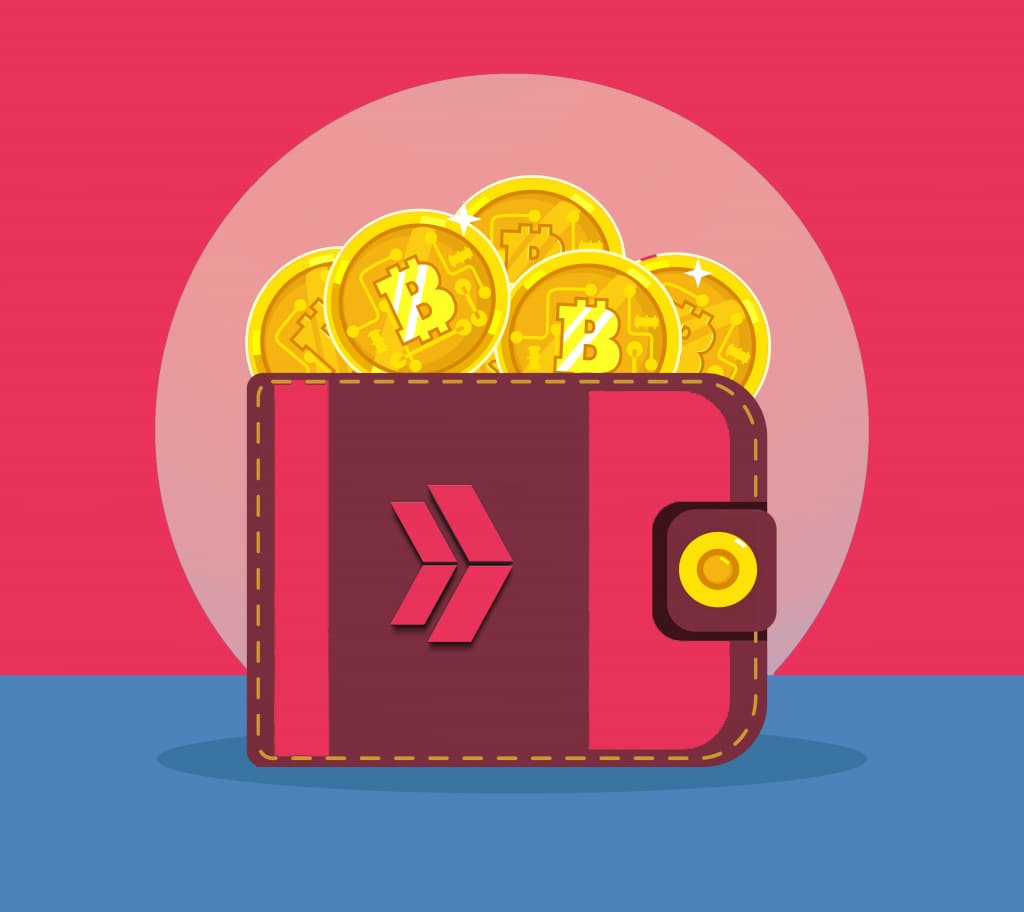
How Do Cold Wallets Prevent Theft?
One of the significant reasons for crypto-asset theft is the vulnerability of private keys. With hot wallets, private keys are generated and stored online. In addition, hot wallets digitally sign transactions online using private keys. This can cause hackers to access the private keys used to sign the transaction after it has been broadcasted.
Cold wallets prevent theft by ensuring private keys are not exposed online and also creating an offline environment to sign transactions.
Can You Lose a Cold Wallet?
It is possible to lose or misplace your hardware or damage your wallet, as in the case of a paper wallet. Therefore, it is important to always do a cold wallet backup for your wallets by keeping your recovery seed safe.
Can Wallets Be Hacked?
Yes, wallets can be hacked especially hot wallets. Hot wallets store their private keys online, either on a device or an application. This makes them susceptible to different hacking strategies, such as using malware or phishing links. Cold wallets are the most secure form of safeguarding cryptocurrency.
What are the Pros and Cons of Crypto Cold Wallets?
One of the significant features that make crypto cold wallets unique is the security they provide. In this section, we will highlight the common pros and cons associated with using cold crypto wallets.
What are the Pros of Crypto Cold Wallets?
Here are the pros of cold crypto wallets;
- Cold wallets are not prone to hacking.
- Every transaction must be signed using the hardware wallet.
- Provides an extra layer of protection with pin protection.
- Assets can be recovered if the seed phrase is still available.
What are the Cons of Crypto Cold Wallets?
Here are the cons of cold crypto wallets
- Hardware wallets are expensive.
- There is the risk of losing your hardware wallet or damaging a paper wallet.
- There is a limit to the number of cryptocurrencies that can be stored in cold storage.
Final Thoughts
A cold wallet is a secure and reliable way to store your cryptocurrency. They provide immunity against hack and theft by storing your private keys offline. Different types of cold wallets are available, with hardware and paper wallets being one of the most popular.
Cold wallets offer higher security than hot wallets, but it is less convenient to use. Unlike custodial hot wallets, they also give you total control over your assets. It is important to always back up your seed phrase when setting up your wallet.




